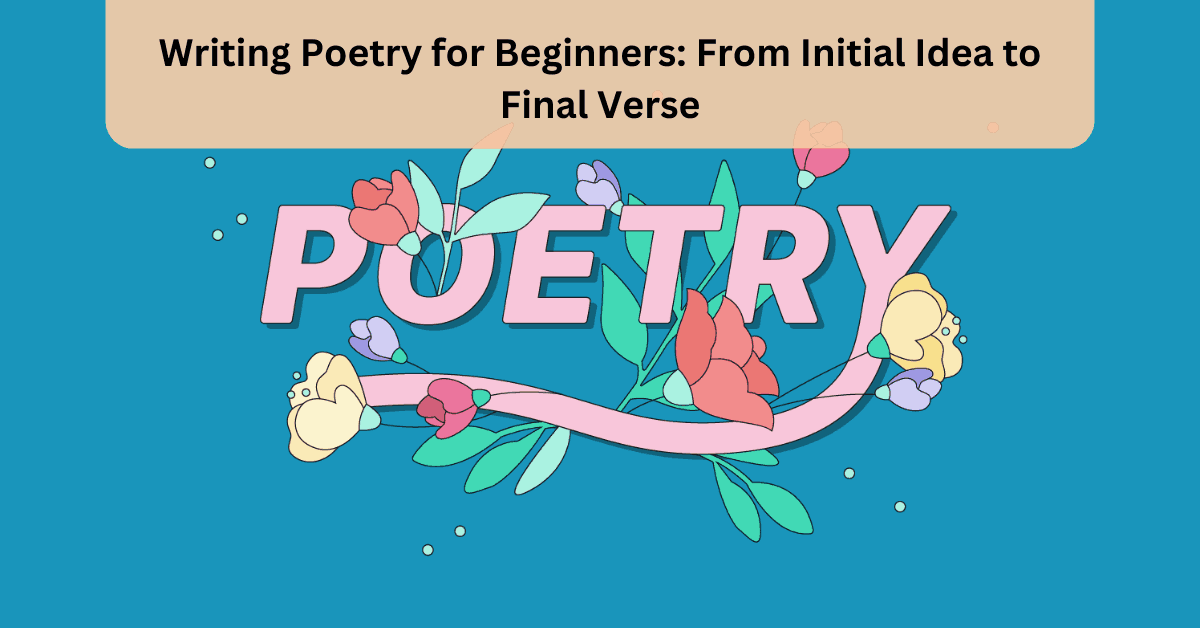Are you ready to embark on a poetic journey? Writing poetry can be a fulfilling and therapeutic experience, even if you’re a beginner. In this guide, we’ll take you through the poetic process, from the initial spark of an idea to crafting your final verse.
Let’s dive into the world of poetry without further ado, where the beauty of language unfolds, and every word becomes a brushstroke on the canvas of emotion.
1. Discovering Inspiration for Your Poem
Ever wondered how to write a poem that truly resonates? Every great poem begins with an idea, a source of inspiration that sparks the creative process. Look around you—nature, emotions, personal experiences, or even a fleeting moment can serve as your muse.
Keep a notebook handy to jot down these snippets of inspiration whenever they strike. You never know how to write a poem until you find the right inspiration, and sometimes, it’s in the most unexpected places.
2. Choose Your Style
Poetry comes in various styles and forms, each with its unique rhythm and structure. Experiment with different styles to discover what resonates with you.
From traditional sonnets to free verse, the possibilities are vast. Don’t be afraid to mix and match styles until you find your own poetic voice.
3. Craft a Compelling Title
Your title is the first impression your poem makes. Capture the essence of your piece with a title that intrigues and draws readers in. It doesn’t have to reveal everything; a touch of mystery can make your audience curious to explore further.
4. Start with Simplicity
For beginners, simplicity is key. Focus on conveying your thoughts in clear and concise language. Avoid overly complex words or convoluted metaphors that might confuse readers. As you gain confidence, you can experiment with more intricate language, but for now, let your words speak with simplicity and clarity.
5. Embrace Imagery
Create vivid images with your words. Poetry is about painting pictures with language, allowing readers to visualize your emotions and experiences.
Use metaphors and similes to evoke powerful imagery that resonates with your audience. Whether it’s the warmth of a summer breeze or the chill of a winter’s night, make your readers feel your words.
6. Play with Sound
The beauty of poetry lies in its musicality. Pay attention to the sound of your words. Experiment with rhythm, rhyme, and alliteration to create a melodic flow.
Read your poem aloud to ensure it has a pleasing cadence. The right combination of sounds can enhance the emotional impact of your words.
7. Experiment with Structure
Poetry doesn’t always have to follow a strict structure, but experimenting with different forms can be a valuable learning experience. Try writing a sonnet, a haiku, or even a limerick. Each structure comes with its own set of rules, challenging you to think creatively within constraints.
8. Convey Emotion
The heart of poetry is emotion. Whether you’re expressing joy, sorrow, love, or anger, let your emotions flow through your words. Be genuine and authentic in your expression. Readers connect with poems that resonate on an emotional level, so don’t be afraid to bare your soul on the page.
9. Revise and Refine
The first draft is just the beginning. Take the time to revise and refine your poem. Trim unnecessary words, clarify ambiguous phrases, and ensure each line serves a purpose. Don’t be afraid to make changes; the revision process is where your poem truly takes shape.
10. Seek Feedback
Share your work with others and welcome constructive feedback. Join a writing group or workshop where you can exchange ideas and insights with fellow poets.
Constructive criticism can provide valuable perspectives and help you grow as a poet. Remember, every poet, no matter their experience, benefits from the input of others.
11. Embrace Rejection
Not every poem will be met with praise, and that’s okay. Rejection is a natural part of the writing process. Use it as an opportunity to learn and improve. Keep honing your craft, and don’t let setbacks discourage you. Even the most celebrated poets faced rejection before finding success.
12. Develop a Writing Routine
Consistency is key in the world of poetry. Set aside dedicated time each day or week to nurture your writing skills.
Whether it’s a quiet morning ritual or a late-night reflection, having a routine helps keep the creative juices flowing. The more you write, the more you’ll develop your unique style and voice.
13. Read Widely
Immerse yourself in the works of other poets. Reading a variety of poems exposes you to different styles, voices, and perspectives. It broadens your understanding of the art form and can spark new ideas for your own work. Don’t limit yourself—explore classic and contemporary poets alike.
14. Stay True to Yourself
While it’s valuable to learn from other poets, don’t lose sight of your unique voice. Your experiences, emotions, and perspective are unlike anyone else’s. Embrace your individuality and let it shine through in your poetry. Authenticity is what makes your work stand out and resonate with readers.
15. Celebrate Your Progress
Writing poetry is a journey, and every step forward is a victory. Celebrate your progress, no matter how small. Whether you’re mastering a new form, receiving positive feedback, or simply finding joy in the creative process, take a moment to acknowledge and savor your achievements.
16. Embrace the Unfinished
Poetry doesn’t always demand resolution. Embrace the beauty of the unfinished poem, allowing it to breathe and evolve. Sometimes, leaving space for ambiguity invites readers to interpret and connect with your words in their own way.
Don’t feel pressured to tie every loose end; let your poetry be a conversation starter, sparking thoughts and emotions that linger long after the last line.
The journey of writing poetry is not always about reaching a destination; it’s about exploring the uncharted territories of emotion and expression, letting your words be a perpetual work in progress. So, revel in the incomplete and discover the magic within the unfinished verse.
Conclusion
From the initial flicker of inspiration to the final refined verse, writing poetry is a deeply personal and rewarding experience. As a beginner, embrace the process, experiment with different styles, and let your emotions guide your words.
With dedication, revision, and a willingness to learn, you’ll discover the joy of creating poetry that resonates with both yourself and your audience.
Celebrate your progress, savor the small victories, and remember that the poetic journey is ongoing—each word you write is a step forward into the boundless realm of self-expression and artistic fulfillment.





